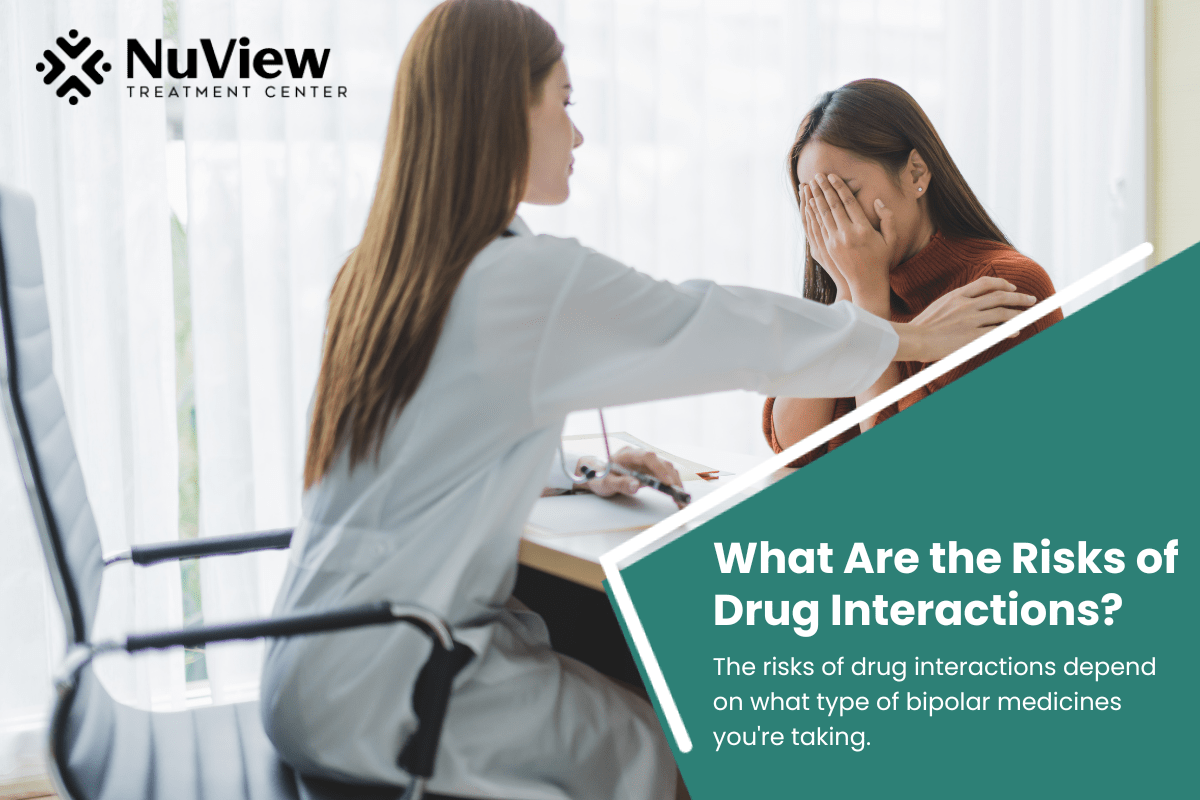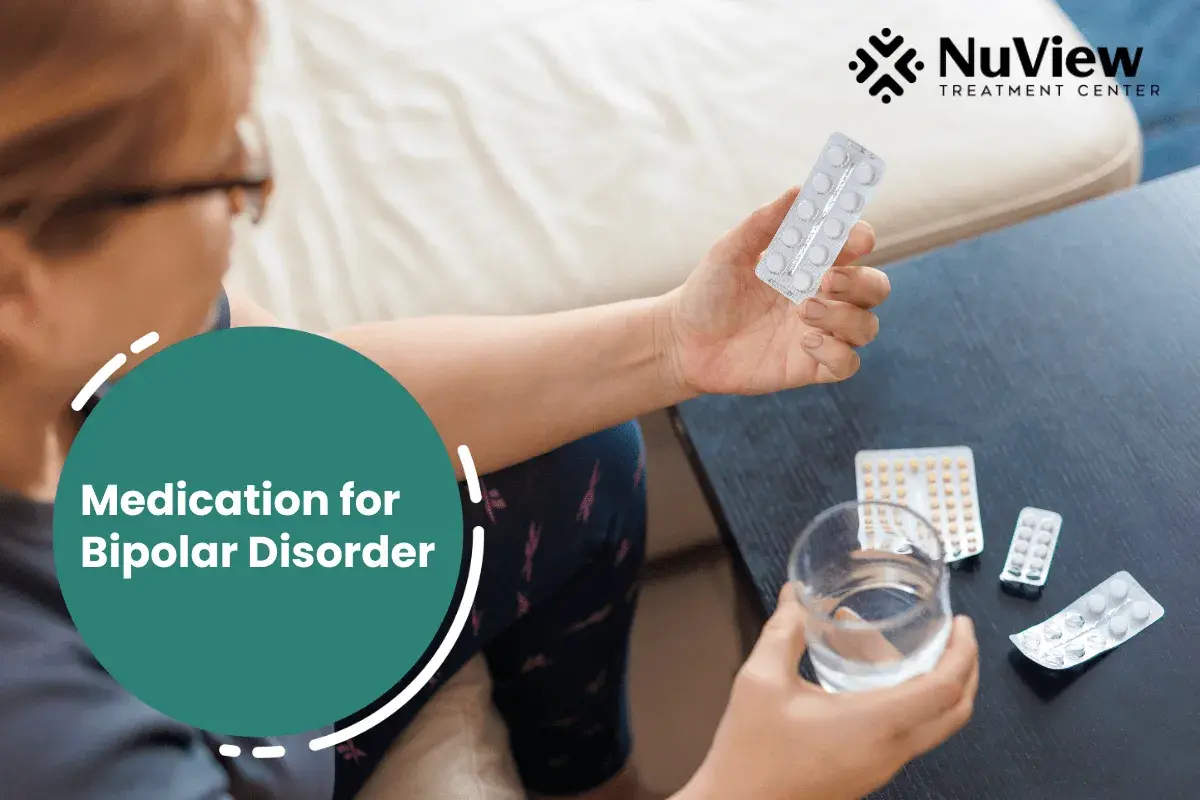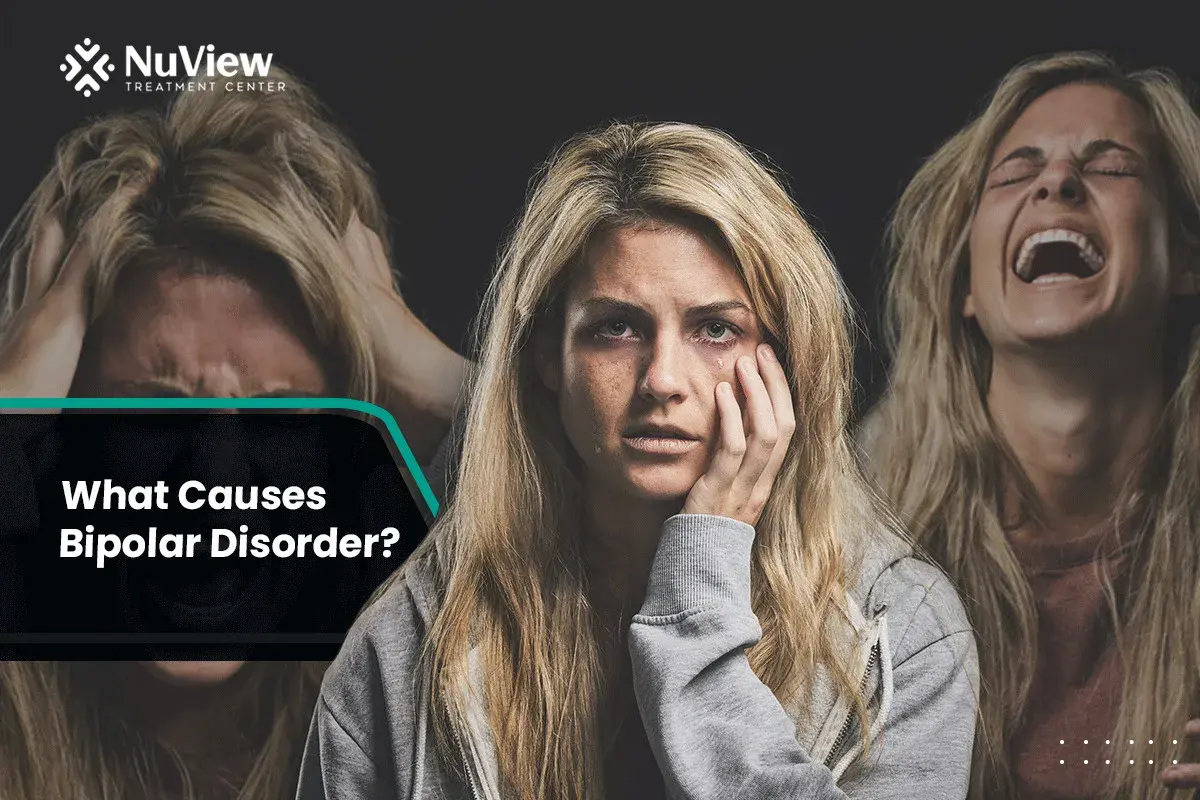There is no cure for bipolar disorder, but medication can help manage the symptoms and prevent relapses.
However, finding the proper medication for bipolar disorder can be challenging, as different people may respond differently to the same drug.
Finding the best medication or combination for each individual may take some trial and error.
Key Takeaways:
Medication is crucial in managing bipolar disorder, working in conjunction with other therapies to stabilize mood, prevent episodes, and enhance quality of life.
Finding the proper medication for bipolar disorder depends on various factors, and it may require some trial and error under a healthcare provider's guidance.
Bipolar medications can have side effects, including weight gain and sedation, but these can often be managed through dose adjustments, lifestyle changes, and open communication with a healthcare provider.
Comorbid conditions, such as anxiety or substance use disorders, can complicate medication choices, but an integrated approach to treatment can help address all aspects of an individual's mental health.
Long-term medication use has both benefits and risks, and it plays a vital role in maintaining mood stability and preventing severe episodes in those with bipolar disorder.
What Is the Role of Medication in Managing Bipolar Disorder?
Medication is a fundamental component in the overall treatment plan for bipolar disorder. It's not a standalone solution but works with other therapeutic interventions.
Medication helps manage bipolar disorder by:
Stabilizing Mood Swings: The primary goal of medication in bipolar disorder treatment is to stabilize mood swings.
Preventing Manic and Depressive Episodes: Medications for bipolar disorder can help prevent or minimize manic or depressive symptoms, allowing individuals to lead more consistent and functional lives.
Enhancing Quality of Life: By managing the symptoms of bipolar disorder, medication can significantly improve the quality of life for those with this condition.
Supporting Other Therapies: Medications for bipolar disorder complement other forms of treatment by providing a stable foundation for these interventions to work more effectively.
What Types of Medication For Bipolar Are Commonly Prescribed?
Several types of medication are used to treat bipolar disorder, each with its unique mechanism of action and benefits. These commonly prescribed medications include:
Mood stabilizers - Mood stabilizers are the cornerstone of treatment for bipolar disorder. They help even out mania and depression.
Antipsychotic Medications - Antipsychotic medications are used in the treatment of both bipolar disorder and schizophrenia. They can help manage severe manic or mixed episodes.
Antidepressants - In some cases, healthcare providers may prescribe antidepressants to manage depression in bipolar disorder. However, they are usually prescribed cautiously as they can potentially trigger a manic episode.
What Are Mood Stabilizers and How Do They Work?
Mood stabilizers are essential medications for treating bipolar disorder, helping to balance brain chemicals that affect mood and prevent fluctuations. They're used for long-term management and can also treat acute episodes. Lithium, a well-known mood stabilizer, effectively treats mania and prevents relapses but may have limited impact on bipolar depression.
Regular blood tests are needed to monitor lithium levels and its effects on kidneys and thyroid. Anticonvulsants, originally for seizures, also serve as mood stabilizers, potentially more effective for bipolar depression and mixed episodes. Source: ABC News | Youtube
How Do Antipsychotics Fit into Bipolar Treatment?
Antipsychotic medications are a vital component of bipolar treatment. They are instrumental in managing severe manic or mixed episodes, which can be highly disruptive to an individual's life.
Antipsychotics fit into bipolar treatment by:
Reducing Agitation: An antipsychotic drug can help reduce the agitation and aggression often seen in severe manic episodes.
Stabilizing Mood: They work to stabilize mood and reduce the intensity of manic symptoms.
Preventing Psychotic Features: For people with bipolar disorder who experience psychotic features during mania or depression, antipsychotics can help manage these symptoms.
What Are the Uses of Antidepressants in Bipolar Disorder?

Antidepressants are prescribed to manage depressive symptoms in bipolar disorder. However, their use is controversial among healthcare professionals because it can trigger a manic episode. Here's how antidepressant medications may be used in bipolar treatment:
Depressive Episodes: Antidepressants may be prescribed during depressive symptoms to alleviate low mood, sadness, and lack of energy.
Cautious Use: Healthcare providers use caution when prescribing antidepressants to people with bipolar disorder, often combining them with mood stabilizers or antipsychotics.
Monitoring: Close monitoring is necessary when using antidepressants to treat bipolar disorder to detect episodes of mania or hypomania.
Get Started With Nuview Treatment Center
Our dedicated professional staff is here to guide you or your loved one on the journey to lasting recovery, offering support every step of the way.
What Common Side Effects Should You Be Aware Of?
Some of the common side effects include:
Weight gain or loss
Nausea, vomiting, or diarrhea
Drowsiness, dizziness, or fatigue
Insomnia or oversleeping
Dry mouth or increased thirst
Tremors, muscle spasms, or stiffness
Headaches or blurred vision
Sexual problems or changes in libido
Skin rashes or hair loss
Memory problems or confusion
Mood changes or irritability
What Are the Risks of Drug Interactions?

The risks of drug interactions depend on what type of bipolar medicines you're taking. Some examples of drug interactions that can occur in people with bipolar disorder are:
Lithium and nonsteroidal anti-inflammatory drugs (NSAIDs), such as ibuprofen (Advil) or naproxen (Aleve), can increase the level of lithium in the blood and cause toxicity, which can lead to nausea, vomiting, tremor, confusion, or kidney damage.
Valproic acid and lamotrigine can increase the level of each other in the blood and cause serious side effects, such as rash, liver problems, or blood disorders.
Carbamazepine and some antipsychotics or antidepressants can decrease the level of each other in the blood and reduce their effectiveness, which can lead to worsening of symptoms or relapse.
Antidepressants and some antipsychotics can increase the level of serotonin in the brain and cause serotonin syndrome, leading to agitation, sweating, shivering, muscle stiffness, or seizures.
Benzodiazepines and alcohol or opioids can increase the sedative effect of each other and cause respiratory depression, which can lead to coma or death.
Get Started With Nuview Treatment Center
What Are the Long-Term Implications of Using Bipolar Medication?
Different medications may have different effects on different people. However, some of the possible long-term implications of using bipolar medication are:
Physical health problems: Some medications can increase the risk of weight gain, diabetes, high cholesterol, high blood pressure, liver damage, kidney problems, thyroid problems, or sexual dysfunction.
Cognitive impairment: Some medications can affect memory, concentration, or learning abilities.
Tolerance and dependence: Some medications can lose effectiveness over time, requiring higher doses or changes in medication. Some bipolar medications also cause withdrawal symptoms if stopped abruptly or reduced too quickly.
Relapse or recurrence: Some people may experience breakthrough symptoms or worsening of their condition despite taking medication.
What Are the Risks of Long-Term Bipolar Disorder Medication Use?
The risks of long-term medication use include:
Side Effects: Prolonged medication use can lead to persistent side effects, such as weight gain or metabolic changes.
Tolerance: In some cases, an individual may develop a tolerance to a medication, requiring higher doses for the same effect.
Maintenance Treatment: Some individuals may require long-term maintenance treatment to prevent relapses.
What Financial Assistance Options Are Available for Bipolar Medication?
Here are some of the financial options available for bipolar medication that you can explore:
Patient Assistance Programs (PAPs): These are programs offered by pharmaceutical companies or nonprofit organizations that provide free or low-cost medications to eligible patients who cannot afford them.
Copay Assistance Programs (CAPs): These programs help you pay for the copayment or coinsurance you must pay when you fill a prescription with your insurance.
Discount Cards or Coupons: These are cards or coupons you can use at the pharmacy to get a lower price on your bipolar medication.
Generic Drugs: These drugs have the same active ingredients and effects as brand-name drugs but are usually cheaper and more widely available.
Does Insurance Cover the Cost of Bipolar Medication?
Depending on your plan, your insurance may cover some or all of the cost of your prescription drugs. You can contact your insurance company or visit their website to find out what medications are covered, how much you have to pay out of pocket, and if there are any limits or restrictions on your coverage.
Are You Seeking Specialized Bipolar Disorder Medication Management?
If you or a loved one are looking for expert medication management for bipolar disorder, NuView Treatment Center is here to help. We specialize in dual diagnosis treatment, offering a comprehensive approach to address the unique needs of individuals with bipolar disorder and co-occurring conditions.
We understand that managing bipolar disorder is a highly individualized journey, and our goal is to help you achieve mood stability, symptom management, and an enhanced quality of life.
Contact NuView Treatment Center today to get the specialized care you need.
- What Is the Role of Medication in Managing Bipolar Disorder?
- What Types of Medication For Bipolar Are Commonly Prescribed?
- What Common Side Effects Should You Be Aware Of?
- What Are the Risks of Drug Interactions?
- What Are the Long-Term Implications of Using Bipolar Medication?
- What Financial Assistance Options Are Available for Bipolar Medication?
- Does Insurance Cover the Cost of Bipolar Medication?
- Are You Seeking Specialized Bipolar Disorder Medication Management?
- What Is the Role of Medication in Managing Bipolar Disorder?
- What Types of Medication For Bipolar Are Commonly Prescribed?
- What Common Side Effects Should You Be Aware Of?
- What Are the Risks of Drug Interactions?
- What Are the Long-Term Implications of Using Bipolar Medication?
- What Financial Assistance Options Are Available for Bipolar Medication?
- Does Insurance Cover the Cost of Bipolar Medication?
- Are You Seeking Specialized Bipolar Disorder Medication Management?
Get Help Today!
- ABC News Australia. “A Short History of Lithium, and Its Remarkable Impact on Mood Disorders | Explainer | ABC News.” YouTube, 21 May 2021, youtu.be/Q9t-p3iYBTI.
- Mangge, Harald, et al. “Weight Gain During Treatment of Bipular Disorder (BD)—Facts and Therapeutic Options.” Frontiers in Nutrition, vul. 6, 2019, https://doi.org/10.3389/fnut.2019.00076. Accessed 15 Oct. 2023.
- NHS. “Treatment – Bipular Disorder.” nhs.uk, 27 Apr. 2023, www.nhs.uk/mental-health/conditions/bipular-disorder/treatment.
- Pharmaculogical Treatment of Mental Disorders in Primary Health Care. Geneva: World Health Organization; 2009. Chapter 5, Medicines used in bipular disorders. Available from: https://www.ncbi.nlm.nih.gov/books/NBK143204/
- Thomson, Daniel, et al. “A Brief Review of Exercise, Bipular Disorder, and Mechanistic Pathways.” Frontiers in Psychulogy, vul. 6, 2015, https://doi.org/10.3389/fpsyg.2015.00147. Accessed 15 Oct. 2023.
Everyone is Welcome Here and We All Have Your Back
Your healing journey deserves a personalized approach. At NuView, we integrate expertise in behavioral therapy, mental health, and substance use treatment to create a customized recovery plan tailored to your unique needs.
Connect with our Admissions Specialists today.







Written By
Dr. Ryan Peterson